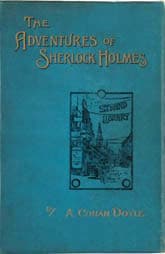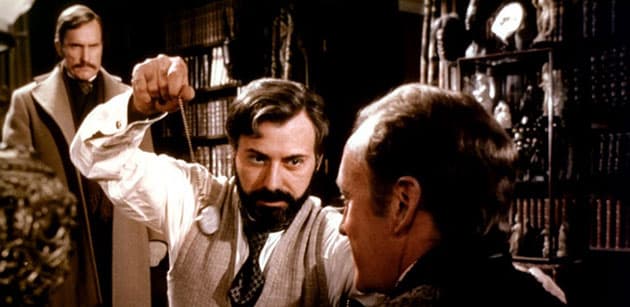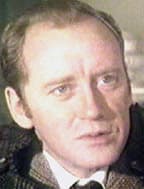The Adventures of Sherlock Holmes
Critique • Quotes • Text • Sherlock Holmes at the movies
 First edition
First editionFirst publication
1892
Literature form
Story collection
Genres
Crime, mystery
Writing language
English
Author's country
England
Length
Twelve stories, approx. 94,000 words

Sherlock Holmes is mesmerized by Alan Arkin's Freud, as Robert Duvall's Watson watches.
Upsetting Sherlock
The Seven-Per-Cent Solution (1976): Film, 113 minutes; director Herbert Ross; writer Nicholas Meyer; featuring Nicol Williamson, Robert Duvall, Alan Arkin, Vanessa Redgrave, Laurence Olivier, Charles Gray
So how about a look into the even more private parts of Sherlock's life: his haunting childhood, his adult drug addiction and what he really did those several years after he was supposedly killed by Moriarty at the Reichenbach Falls?
We get all this in The Seven-Per-Cent Solution (1976), which is not based on Doyle's work directly but on one of three Sherlockian novels by Nicholas Meyer, who also adapted it for film.
The film sports some of the heaviest weight actors around at the time. We meet this Holmes, essayed by acclaimed Scottish thespian Nicol Williamson, in the midst of a fit induced by drugs—his mixture of seven percent cocaine and ninety-three percent saline water.
If you think it's strange to have a fair-haired, ruddy-faced Holmes, how about an irrationally raving, paranoiac Holmes?
His partner in detection is Robert Duvall with a convincing British accent and his brother is Charles Gray, who would reprise his role as the best Mycroft ever in the later Jeremy Brett television series. The two join forces to trick Sherlock into chasing his supposed arch-enemy Moriarty—played by Laurence Olivier, no less, as something other than a criminal mastermind—to Vienna where his drug addiction can be treated by Sigmund Freud, essayed by Alan Arkin. (The great actors just keep coming.)
Yes, it's another case of mixing historical characters into the story to give it the illusion of having more import. But does it have to be Sigmund Freud, who is depicted as being an ultra-rationalist like Holmes, instead of the unscientific speculator he was in reality? Ah well, for the film's make-believe world, writer Meyer and actor Arkin do a good job of turning the detecting duo into a credible trio: Holmes, Watson and Freud.
While visiting Freud, Holmes is drawn into another great mystery, the kidnapping of a singer (Vanessa Redgrave), that has international implications. Our triumvirate of heroes engage in logical analysis, hypnosis and sleuthing, plus derring-do with sabres atop speeding trains. It's all quite engaging if you can put aside your qualms over how this might affect the Holmes canon.
Williamson is particularly disturbing. He's always been a somewhat over-the-top kind of actor, and here his histrionics are too convincing as a somewhat less than masterful Sherlock. Makes you wonder how you could ever appreciate the character again as you once had before seeing this movie.
But not to worry. A close-to-perfect and faithful Holmes is to make an appearance to reclaim the character's iconic status in the next decade.
— Eric
Critique • Quotes • Text • Sherlock Holmes at the movies
1922, 1929–1933, 1931–1937, 1939–1946, 1954–1955, 1959–1984, 1962–1992, 1965, 1970, 1975–1988, 1976, 1979, 1982, 1984–1994, 2000–2002, 2002, 2002b, 2009–2011, 2010–2017, 2012–2019, 2015


